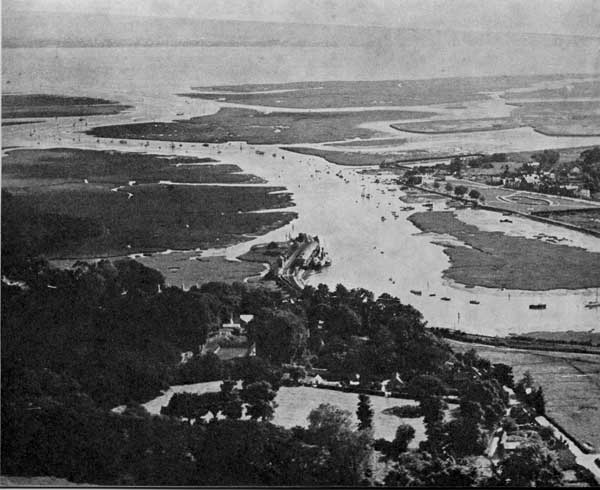The Great War: 1914-1918
 The river in the 30s
The river in the 30s
The Shut-down:
The Lymington River Sailing Club closed down. Boom defences appeared in the
Western Solent and Examination Vessels anchored off Yarmouth. Gun barrels
sprouted from Fort Victoria and Hurst Castle. By the end of the year, Emden
had closed the trade routes in the Indian Ocean and halted the troop convoys
from Australia and New Zealand; von Spee had annihilated Cradock's squadron.
Hopes of a swift victory faded. 1915 would not see the beginning again of
sailing.
Berthon Boat Company:
The Berthon Boat Company was founded in Romsey in 1877 by the Rev. E. L.
Berthon, a Peer of the Realm, a Member of Parliament, and an Officer in St.
George's Volunteers; and by three solicitors, to build boats and "other
floating machines". As well as punts, skiffs and other craft for the use of
19th Century sporting gentlemen, the yard also built the famous Berthon
Collapsible Boats. These folding boats, built with a double skin and divided
into six sections with an air space between the skins, were unsinkable and
were widely used by the Navy as well as by pnvate yachtsmen throughout the
world. In 1917, H. G. May bought the Berthon Boat Company and, the following
year, the Lymington Shipyard, thus continuing in Lymington a long tradition
of building wooden yachts.
After the Armistice:
"Peace is come and wars are over, Welcome you and welcome all." Alfred
Edward Housman. There could be no greater healer for those who returned than
the call of the Lymington estuary. Craft of all descriptions soon began to
appear in the river. There was no organisation to channel the energies of
the new boat owners, but Captain Harper was a zealous and busy Harbour
Master. Paddling about the river in his duck punt, he would collect his 5/-
annual harbour dues from the prams and a little more for the larger craft.

